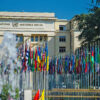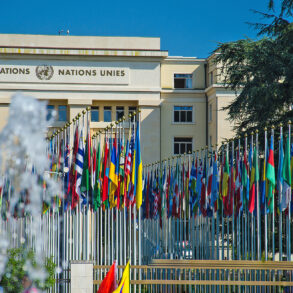Operation Luxor was supposed to be an unprecedented blow against “Islamists” in Austria. Instead, the raid will probably go down in the country’s history as an unprecedented abuse of justice and security authorities.
The largest police operation in Austria’s post-war history… Decisive blow against Hamas and the Muslim Brotherhood… Important measure against radical Islamism… Devastating action against the roots of political Islam in Austria… When Austria’s Interior Minister Karl Nehammer presented the results of the night-time police raids on 9 November 2020, the message was clear: Austria’s investigating authorities had succeeded in doing something unique, even historic.
Barely two years after special units stormed the homes and business premises of Muslim citizens all over the country, it is clear: Austria’s supposedly biggest blow against Islamisation, political Islam and the Muslim Brotherhood is at best the biggest intimidation campaign against ordinary Muslim citizens the country has ever seen. Whereby the last sentence is not quite right. For there are credible indications that Operation Luxor is an air act, and not just today.
From the very beginning, journalists, lawyers and other experts pointed to the thin justification and lack of evidence for the operation. Even in the order, one searched in vain for solid criminal charges that legitimised the action and proved the image of a widespread terrorist threat and Islamist infiltration of Austrian society.
At the same time, the authorities cannot at least be accused of not having tried: 21,000 hours of observation by the Office for the Protection of the Constitution preceded the action. More than 1.2 million photos and videos were taken of meetings and gatherings of Muslim citizens. Almost 1,000 police officers were deployed on the night of 09 November 2020 alone. 60 houses were searched, at times more than 100 suspects were investigated.
But the balance sheet of Operation Luxor is still as modest almost two years later as it was on the first day: to date, neither weapons nor secret plans for a coup have been found. Not even one of the accused has been charged in a court of law, remanded in custody, let alone convicted. On the contrary: In several cases, investigations were closed without results, and confiscated funds and properties had to be released.
The only tangible legal results produced by Operation Luxor to date are not directed against the accused Muslims, but against the state authorities investigating them. The list that shows how high the political motivation and low the legal substance behind the accusations was from the beginning is getting longer by the month:
As early as November 2020, the magazine ZackZack reported on the possible background of the action: the judiciary and the police had mainly complied with requests from Egypt and Israel in the raids against Austrian citizens. This was suggested by files of the public prosecutor’s office in Graz. At no time had any of the accused posed a terrorist threat. There was also no connection to the attack of 2 November 2020, in which an IS sympathiser killed four people in Vienna.
In June 2021, the daily newspaper Die Presse reported on investigations against senior officials of the Federal Office for the Protection of the Constitution and Counterterrorism (BVT). The BVT is said to have targeted Muslim citizens for political motives without any concrete suspicion.
In August 2021, the Graz Higher Regional Court declares several raids of Operation Luxor unlawful and generally criticises the thin evidence of the investigators. Furthermore, the court questions the central premise of the investigations: the Muslim Brotherhood is so diverse that not every follower can automatically be considered a terrorist.
Because of the appearance of bias, the Graz Higher Regional Court dismissed the prosecution’s experts on the Muslim Brotherhood, Heiko Heinisch and Nina Scholz, in June 2022. Heinisch is still active on the scientific advisory board of the Documentation Centre for Political Islam.
In July 2022, due to insufficient suspicion, it declares parts of the surveillance measures in the context of Operation Luxor unlawful and orders all results of the surveillance to be destroyed.
In August 2022, the prosecution’s key witness is sentenced to a fine for defamation. He is said to have wrongly associated the accused with the Muslim Brotherhood. The court also does not believe the prosecution’s exculpatory witnesses, among them the theology professor and head of the scientific advisory board of the Documentation Centre for Political Islam Mouhanad Khorchide.
In the meantime, one hardly hears anything about the operation from the former political advocates of Operation Luxor. Karl Nehammer, who has since risen to the position of Federal Chancellor, was not so wrong at the time. Operation Luxor can still be described as historic almost two years later. Not as a historic blow against Islamisation, “political Islam” or the Muslim Brotherhood. Rather, it was a historic abuse of the judiciary and the security authorities and an unprecedented state lawlessness against the country’s Muslim citizens.











